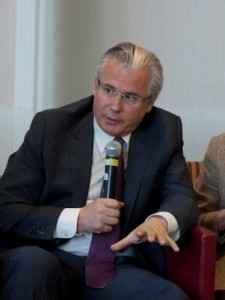No man is a prophet in his own country: On Garzón’s legacy
(Texto en castellano aquí.) The astoundingly profound and widespread contributions of Spanish Judge Baltasar Garzón to the promotion of justice and human rights have been everywhere on display these last two weeks of October (October 16-30, 2011). Though not always acknowledged in the headlines and soundbytes that are streaming in these days from farflung places like Argentina, Libya, and Spain, Garzón’s hand in a series of momentous breakthroughs is obvious to anyone who has been following the Judge’s career over the last 15 years.
Valencia, Spain, October 18, 2011
Camps Will be Tried for Bribery, But After the Elections
A date has been set (12 December) for the bribery trial of the former President of the Autonomous Community of Valencia, Francisco Camps. The trial is considered by many to be the tip of a vast iceberg of corruption involving high-ranking officials in the Partido Popular, which was originally uncovered by the investigations of Baltasar Garzón.
Basque Country, Spain, October 20, 2011
ETA Abandons Violent Struggle
“After more than 40 years of violent struggle for independence in the traditional Basque homeland in Spain and France, the separatist group ETA declared a unilateral end to its campaign of bombings and shootings on Thursday, saying it wished to seize a ‘historical opportunity to reach a just and democratic resolution to an age-old political conflict’” (New York Times).
All experts on the Basque conflict are in agreement that Garzón’s innovative approach to the problem of terrorist violence in the Basque region played a key role in the weakening of ETA over the last decade and a half. Taking a page from Eliot Ness’s prosecution of organized crime in prohibition America, Garzón managed to change the emphasis of the campaign against ETA, implacably framing it less as a political or military challenge, and more as a judicial and fiscal investigation into the armed organization’s “entorno” or support infrastructure.
Libya, October 24 2011
Libyan dictator Muammar el-Qaddafi Killed
The investigation, arrest warrant and request for extradition of Qaddafi by the International Criminal Court in the Hague restricted the Libyan dictator’s movements over the last several months, undoubtedly contributing to the Colonel’s ultimate downfall. As adviser to the ICC, Baltasar Garzón worked on the the Qaddafi prosecution, alongside his colleague from the Audiencia Nacional, prosecutor Dolores Delgado.
Ciudad Real, Castilla-La Mancha, Spain, October 27, 2011
“Civil Guard and Judge Visit Mass Grave in Chillón” (Europa Press)
Spanish law states that any time that human remains are uncovered that show signs of violence or potential criminal wrongdoing, police and court authorities are obliged to visit the scene, to take testimony and file a report. According to the Association for the Recovery of History Memory, which has carried out exhumations of hundreds of victims of Francoist repression, only on a few occasions have police and court authorities fulfilled those duties; in most instances, if the exhumed victims are thought to be victims of the Francoist repression, the police and courts have shirked those responsibilities.
Judge Garzón’s courageous stance on the question of Francoist crimes, the rights of victims, and the issue of judicial competence or jurisdiction –a stance which has earned him prosecution and suspension by his judicial colleagues in Spain—have undoubtedly played a role in motivating police and judges like those in Ciudad Real, to comply with their legal and professional obligations.
Argentina, October 28, 2011
“12 Given Life Sentences from Crimes During Dictatorship.”
Alfredo Astiz and 11 other former military and police offers have been sentenced to life in prison for cries committed during the 1976-1983 military dictatorship, a court announced Wednesday…” (New York Times)
The Argentine government, and Argentine civil society have repeatedly expressed their gratitude to Judge Garzón for his principled and indefatigable assistance in bringing to justice Argentine war criminals, despite laws of amnesty and claims of expired statues of limitations. In 1997, Garzón had ordered the arrest and extradition of 45 Argentine military officers, Astiz among them, charging them with genocide and state terrorism.
Garzón himself has also been in Spanish headlines this week. But not for the reasons one might think. Though it may be hard to believe, this past week the Spanish Supreme Court announced that Garzón’s own trial –for allegedly using illegal wiretaps as part of his investigation into political corruption in Valencia and Madrid—will begin on November 29, before any other trial related to the vast Gurtel corruption ring. And everything points to a swift opening of another trial against Garzón, in which he is charged with abusing his authority and overstepping his jurisdiction by ordering an investigation into alleged crimes against humanity committed by the Francoist regime. Garzón will be the first person in history brought before a court of law for a case related to Francoist atrocities: for having dared investigate them! Like some kind of sick Halloween joke, while defenders of the rule of law and human rights from all over the world celebrate a series of breakthroughs to which Judge Garzón has made fundamental contributions, the Spanish judiciary prepares to pillory him for some of those same actions. Never before has the old adage been more true: No man is a prophet in his own country. (Texto en castellano aquí.)
Addendum: 7 November
Spain’s Minister of Justice admitted today that Garzón’s predicament ” is very difficult to explain outside of Spain” given his superb record in defense of human rights and freedom. The Minister made the comment as the suspended Judge accepted yet another international honor, joining the European Committee for the Prevention of Torture, a position to which he was elected last June by the Committe of Ministers of the European Council. This is just the last in a string of internatinal appointments and prizes recognizing Garzón’s extraordinary contributions: the International Criminal Court, the Organization of American States, the ALBA Puffin Prize and a very long etcaetera.













